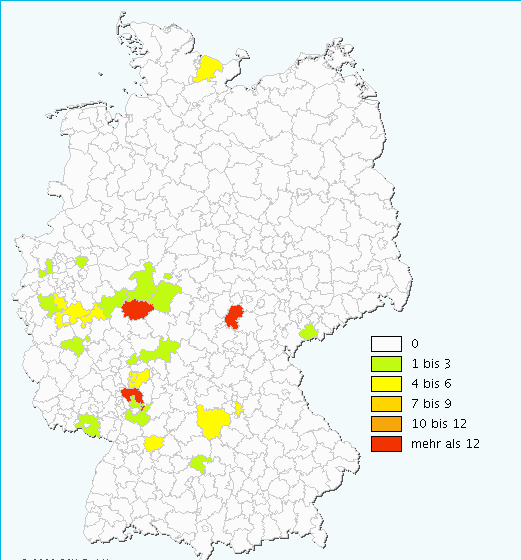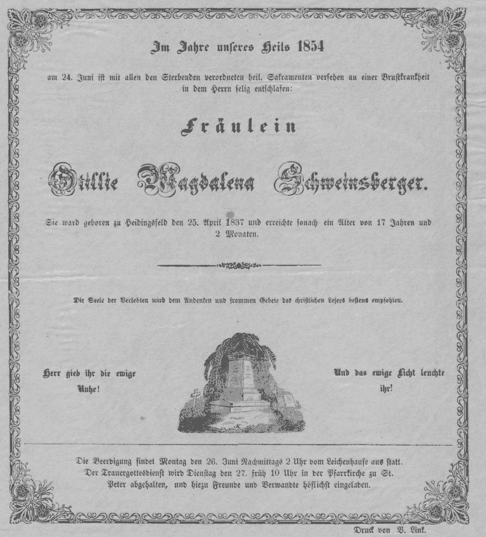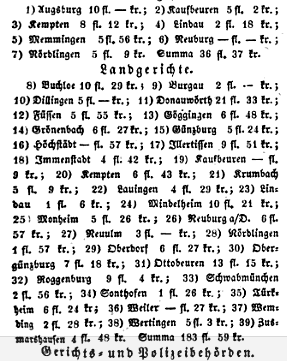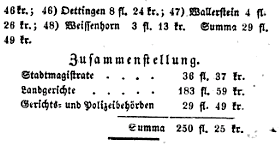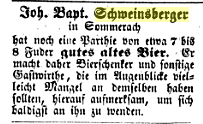Multiple members of the family had their problems in the mid to late 19th Century. Johann [b. about 1815-17 probably the son of JBS-I, the beer brewer, and an uncle of my great great grandfather Ignaz Schweinsberger] had lots of financial problems. As mentioned last time, Uncle Johann was in the news nearly every month beginning in January of 1853 over a lawsuit against him by Dr. Sieber of Fechenbach. Johann was unable to repay a mortgage loan, so eventually his house was to be put up for auction. The claim against him is summarized below:
“(28b) Upon the advice of a mortgage creditor, the following as described … subject to the regulations of §§ 64 and 69 of the mortgage law, under the regulations announced at the court date from March 2nd of this year in the afternoon, publicly to be auctioned. Würzburg , January 25th 1853 Royal District and City court as ordered Wilhelm Heuflager Description: The Living estate, situated in front of the basement gate, is build with stone and studwork and two stories high with a German wide bricks covered roof. The construction condition is fair and the break down is as follows: 1) Under the house is an arched basement without content 2) First story passes an airway, 2 rooms with an oven, a kitchen and a storage room 3) Second story has an airway. 4 rooms, an oven, a kitchen; finally above that a freestanding attic. Attached to this estate is a spacious courtyard with a gateway and is enclosed partially with walls and partially with a wooden fence, in which a hall is located and to studwork a hog house; also a single storied studwork house is build here which is covered with a wide brick roof. The same contains a washhouse with an enclosed copper, two immured brandy pots a workspace and adjoining a baking oven. At the end of the courtyard is a barn which is build with studwork and covered with a German wide brick roof; it contains an entrance way, a quarter and a double cattle stables and an arched basement. Furthermore bordering to the house is a yard and in the back is a big vegetable garden; both are closed off with walls and a fence.”
In February they were back in court because the auction didn’t produce enough money to pay off Dr. Sieber. Würzburger Abendblatt Volume 13 2/11/1853: (69a) …according to the demands, because the set amount of 4000 Franken was not collected from the said estate, a new court date is ordered for Thursday the 21st of April of this year at 11 am in courtroom number 9 with the aggrieved parties, so that the additional fee will be paid without consideration of the earnings.” Eventually the case was dismissed and Dr. Sieber had to be satisfied with the auction results. However, Johann got into more trouble in October of 1863. He was found guilty of petty theft and served 3 days in the jail of Kitzingen, a small town, 18km south of Würzburg. The next year in the Würzburger Indicator August 14th, 1864, it was reported that he was accused of domestic violence. For this offense he was sentenced to two months in prison, but on appeal the case was dismissed. Uncle Johann disappeared from the record after this point, only turning up in 1870 living near Ignaz in Munich.
Things were more problematic for Ignaz’ brother Franz [b. Aug 1841]. Three years older than Ignaz, Franz went to the same trade school but did less well. Note that he was not well focused; his area of concentration in school was listed as “ohne” or “without.” Here are his grades [the column’s meaning is as described in Episode 41] for the two years he attended this school: 1855-56 grades while at Jahres-Bericht des Polytechnischen Vereins zu Würzburg über den Stand seines  His grades III/IIII were average to low. In the next year he listed “economics” as his focus of study, However, while many of the students were getting all “I,” his grades were all failing “V”.
His grades III/IIII were average to low. In the next year he listed “economics” as his focus of study, However, while many of the students were getting all “I,” his grades were all failing “V”.  What was going on with him that he failed in school? It turns out that he had some issues with the police. In 1856 while still in school, he was charged with “aggravated theft.” “Aggravated” presumably implies a weapon was used during the episode.
What was going on with him that he failed in school? It turns out that he had some issues with the police. In 1856 while still in school, he was charged with “aggravated theft.” “Aggravated” presumably implies a weapon was used during the episode. 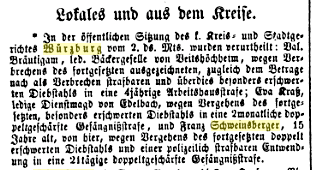 Translation: “In the public meeting of the area and county courts Würzburg on the second of this month, the following have been sentenced: Bal. Bräutigam. Single cleaning assistant from Breitshöchheim, due to the continuous crimes distinguished by the sum as punishable to four years in a work prison; Eva Kraß, single maid from Edelbach, because of offense of aggravated theft to 2 month (double harsh) prison; and Franz Schweinsberger, 15 years old, from here, because of offense of double aggravated theft and punishable petty larceny to 21 days in prison.” The light prison sentence [21 days] was given because of his age. The prison time unfortunately didn’t get him on track. On Saturday the 16th of October 1858 he was again facing a public hearing related to more theft. He had started working as an apprentice butcher, but in August 1859 he was sentenced to 2 more years in the prison workhouse for theft as a repeat offender. Aug 20 1859– Würzburger Stadt- und Landbote: Allgemeiner Anzeiger für Würzburg und Umgebung
Translation: “In the public meeting of the area and county courts Würzburg on the second of this month, the following have been sentenced: Bal. Bräutigam. Single cleaning assistant from Breitshöchheim, due to the continuous crimes distinguished by the sum as punishable to four years in a work prison; Eva Kraß, single maid from Edelbach, because of offense of aggravated theft to 2 month (double harsh) prison; and Franz Schweinsberger, 15 years old, from here, because of offense of double aggravated theft and punishable petty larceny to 21 days in prison.” The light prison sentence [21 days] was given because of his age. The prison time unfortunately didn’t get him on track. On Saturday the 16th of October 1858 he was again facing a public hearing related to more theft. He had started working as an apprentice butcher, but in August 1859 he was sentenced to 2 more years in the prison workhouse for theft as a repeat offender. Aug 20 1859– Würzburger Stadt- und Landbote: Allgemeiner Anzeiger für Würzburg und Umgebung 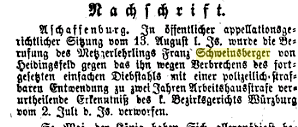 “Postcript. Aschaffenburg. In Public Appellate Court meeting on 13 august…was for the crime of theft against apprentice butcher Franz Schweinsberger of Heidingsfeld, … …to two years punishment in the workhouse… the Kings District Court Würzburg from July 2 b.”
“Postcript. Aschaffenburg. In Public Appellate Court meeting on 13 august…was for the crime of theft against apprentice butcher Franz Schweinsberger of Heidingsfeld, … …to two years punishment in the workhouse… the Kings District Court Würzburg from July 2 b.”
In January 1861 there is another news account of a theft; it is not clear what the punishment for that was. However, in July 1863 he was sentenced once again to 3 months for theft. Nürnberger Abendzeitung: (Bayerischer General-Anzeiger).july 16 1863 …3 months in jail.  Translation: “From Nüruberger Royal District Courts was the single journeyman butcher Schweinsberger of Sommerach … because the thief stole … prison punishment … from 3 months is condemned”
Translation: “From Nüruberger Royal District Courts was the single journeyman butcher Schweinsberger of Sommerach … because the thief stole … prison punishment … from 3 months is condemned”
When next out of jail he worked as a butcher and married 21 year old Margaretha Kuhn. He fathered a son whom he named “Johann Baptist” in honor of his grandfather [beer brewer JBS-I] and father [blacksmith JBS-II]. The infant died at 5 months age on July 23, 1870. The death notice for this Johann Baptist notes he was a “master butcher’s child” [metzgermeisterkind]. Falling in love and losing a child may have been the most important events in Franz’ life.  Nonetheless, seven years later on Nov 7 1877 the Munich Central Police were looking for him yet again.
Nonetheless, seven years later on Nov 7 1877 the Munich Central Police were looking for him yet again.  Bavarian Central Police journal November 3, 1877 Volume 12 Nr. 85: “6429. Schweinsberger Franz, married, butcher and cattle driver from Guenthersleben, lastly in Heibingsfeld because of theft according to § 242, Article 135 and 136. Wurzburg 3 11 77. R. Unt.- Judge Guenthersleben [now called Güntersleben] is a small town 15km north of Würzburg. Nine days later the police gave a description of Franz’ appearance to aid in his apprehension.
Bavarian Central Police journal November 3, 1877 Volume 12 Nr. 85: “6429. Schweinsberger Franz, married, butcher and cattle driver from Guenthersleben, lastly in Heibingsfeld because of theft according to § 242, Article 135 and 136. Wurzburg 3 11 77. R. Unt.- Judge Guenthersleben [now called Güntersleben] is a small town 15km north of Würzburg. Nine days later the police gave a description of Franz’ appearance to aid in his apprehension. 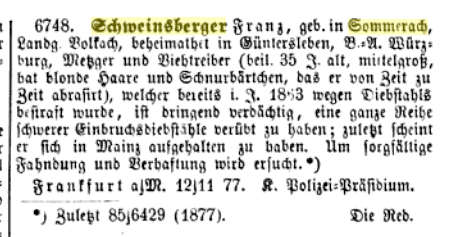 November 12, 1877 Central police “6748. Schweinsberger Franz, born in Sommerach, City council Wolsach, currently living in Guenterseleben, court Würzburg, butcher and cattle driver (35 years old, middle tall, blond hair and mustache, which he shaves from time to time). He has already been punished for theft in 1853 and is strongly suspected to have committed a whole series of serious burglary thefts; it appears that he has been staying in Mainz lately. A careful search and arrest is requested. Frankfurt on the Main, 12 11 77.Police department Lastly 85, 6429 (1877) “
November 12, 1877 Central police “6748. Schweinsberger Franz, born in Sommerach, City council Wolsach, currently living in Guenterseleben, court Würzburg, butcher and cattle driver (35 years old, middle tall, blond hair and mustache, which he shaves from time to time). He has already been punished for theft in 1853 and is strongly suspected to have committed a whole series of serious burglary thefts; it appears that he has been staying in Mainz lately. A careful search and arrest is requested. Frankfurt on the Main, 12 11 77.Police department Lastly 85, 6429 (1877) “
The record from Bavaria is silent after this point. But it is very unlikely that Franz committed these crimes, because he had left Germany more than a year before these 1877 police bulletins. In an attempt to make a fresh start, he had taken his family to America, arriving Oct 12, 1876. In fact, there is no evidence that he did anything worthy of police attention after marrying Margaretha, but his past haunted him. He was automatically a prime suspect when theft was reported anywhere near Würzburg. Decades after the family emigrated, the Bavarian Police were still unaware that these Schweinsbergers had left the country. In 1898 they were looking for Franz’ sons Johann and Lorenz as draft evaders, not realizing they had left 22 years before as small children. In Brooklyn, Franz changed his name to Frank and Margaretha became Margareth. They moved into a neighborhood filled with German speakers. The neighbors were named Seizer, Wilke, Kramer, Humphrey and Schmid … all family names found in Würzburg. One of the neighbors may have been an old friend who helped Franz arrange travel, housing and a job. This neighbor was Hermann Wilke who, like Franz, was a butcher. Hermann was about 28yrs old with a wife, Babetta, and an infant son, Frederick, when Franz and family arrived. Hermann and Babetta had come to America the year before Frank and family. Frank was hired as a butcher in one of the local slaughterhouses, and continued in that trade for years.
Frank appeared before the Common Pleas Court of New York on Oct 6, 1888. This was his first and last contact with the US Court system. On that day he was sworn in as a US citizen. Internet searches using the terms “jail,” “prison,” “convicted,” “police,” “theft,” and “thief” with Frank Schweinsberger [and variant spellings] all yield negative results. He and Margareth lived the rest of their lives in Brooklyn. They had a large family: Johann Baptist [b. 1870], John [b. 1871], George [b. 1874], Frederick [b. Sept 1875], Barbara [b. 1878], Retsa [b. 1879], Andrew [b. Jun 1881], Margaret [b. Nov 1883]. There are many Brooklyn and Queens Schweinsbergers today who are their descendants. Franz had a delicatessen for the last ten years of his life. So his tale is one of redemption. He went to America in hopes of making a fresh start and driven by love for wife and family, he turned his life around. Of all the family stories I’ve found, the story of my great-great-great uncle Franz is my favorite. Both he and Margareth appear to have died some time between 1910 and 1920; I can’t find either in the 1920 US Census.
So did the problems of close relatives have anything to do with the decision of my great great grandparents Ignaz Schweinsberger and Barbara Trenkler to immigrate to America? As a locksmith, one can imagine that the family notoriety could have caused him problems getting business. It may well be that the moves to Munich, and then later to America, were influenced by adverse publicity. But Ignaz came to America decades after the problems of his grandfather and uncle, and ten years after brother Franz had gone to Brooklyn. The decision to go may have been influenced simply by the opportunities offered in a new life. His brother Lorenz had already made good in Kansas City. But the fact that brother Franz had so dramatically turned around his life may have been a major factor. Anything was possible in America. By the end of the 19th Century it appears that all of the Schweinsbergers descended from beer brewer JBS-I, except for the family of Johann [b. ~ 1815], had died or immigrated to America. Next time…the letters
